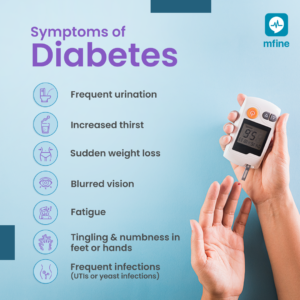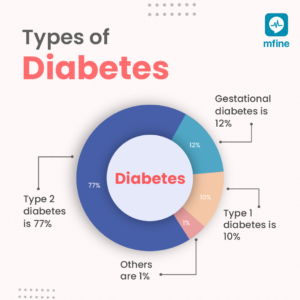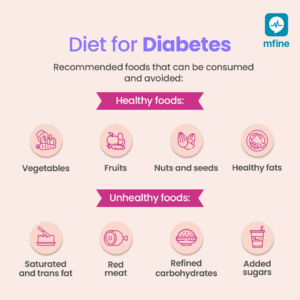Q. How does COVID-19 affect a person with diabetes?
A. People with diabetes are at a higher risk of suffering severely from COVID-19 as the complications and symptoms associated with the virus in such people get severe. For instance, the inflammation in the body of a diabetic person is more, and this gets worse due to COVID.
Q. How does diabetes affect your heart, eyes, feet, nerves, and kidneys?
A. It is a matter of concern when your diabetes is not well controlled. The small and large blood vessels get affected due to uncontrolled sugar levels in the body.
- In the heart, the large blood vessels get blocked because of the inflammation and damage to blood vessels caused by high blood sugars, which causes an increased propensity of clot formation.
- The smaller blood vessels are affected in the eyes, leading to vision problems or blindness.
- There are two ways high blood sugar can be problematic in the feet. First is when the nerves leading to feet can get affected, resulting in no sensation of pain or other problems in the feet. The second is when the blood circulation gets affected. When there is poor blood circulation, any injury to the feet takes a longer time than usual to heal. This may also end in gangrene and amputation.
- When the nerves get affected by the high blood sugar, the amount of oxygen reaching the nerves reduces, and therefore, the signals related to pain will be stopped.
- When the blood vessels in the kidney become narrow because of high blood sugar, the waste removal from the body reduces as the path is clogged. This results in kidney malfunctioning and may result in kidney failure.
Q. How does diabetes lead to amputation?
A. In some diabetic patients, the blood sugar levels are so high that they may suffer from peripheral artery disease (PAD), which causes narrowing of blood vessels and reduction in the blood flow to legs and feet. This condition may also result in nerve damage known as peripheral neuropathy. This is a major concern because patients will not feel any pain in their legs or feet. Any wounds or cuts on the feet will go unnoticed because of peripheral neuropathy. Increased pressure on such areas will result in infection, and because of less blood flow, the wounds will also take longer to heal. The existing infection may spread to the bone as the tissue is damaged. To stop the further spread of the infection, amputation becomes necessary.
Q. Can diabetes cause blindness?
A. If proper care is taken during the initial days of diabetes, then it will not cause blindness. However, if the blood sugar levels are not under control, it may damage the eye’s retina, leading to blindness. Therefore, having annual eye screening is vital for diabetic patients.
Q. Can diabetes cause hearing loss?
A. We know that nerve damage is a possible concern when diabetic. High blood sugar levels damage the inner ear’s small blood vessels and nerves, while low blood sugar levels damage the nerve signals between the inner ear and the brain. Therefore, any nerve damage in the ear due to diabetes can cause hearing loss. Therefore, we can say that diabetes can also cause hearing loss if the nerves in the ears are damaged.
Q. Can diabetes cause headaches or dizziness?
A. Yes, diabetes can cause headaches and dizziness. At the same time, dizziness may be due to dehydration caused by high blood sugar (due to frequent urination). When the blood sugar is too low, it is known as hypoglycemia which blocks the glucose from reaching the brain, and this causes frequent headaches. Hypoglycemia or low blood sugar can also trigger headaches, dizziness, and other neurological symptoms.
Q. Can diabetes cause hair loss?
A. Since diabetes is a chronic condition, it can affect a person’s body differently. In some cases, diabetes can cause hair loss or hair thinning as the blood vessels that carry oxygen to the hair follicles are damaged. The primary reason for this hair loss is uncontrolled blood sugar levels and physical stress, and hormonal imbalances.
Q. What types of diabetes require insulin?
A. People with type 1 diabetes undoubtedly require insulin as their bodies cannot make it on their own. In comparison, Type 2 diabetics require insulin depending on the severity and the progress of their blood sugar levels.
Q. Can you be born with diabetes? Is it genetic?
A. A baby born with diabetes is known as neonatal diabetes, and it’s caused due to genetics.
Type 1 diabetes is usually associated with a strong family history. However, Type 1 and Type 2 diabetes are genetically linked, and genes are passed down from mother and father. Type 2 diabetes can be due to bad lifestyle choices and genes inherited from parents, but primarily influenced by environmental factors rather than a genetic predisposition.
Q. What is diabetic ketoacidosis?
A. Diabetic ketoacidosis, also known as DKA, is a serious complication of diabetes that develops in the body when the blood sugar is high for too long. This happens when there is not enough insulin in the body which is a major source of energy to the tissues and muscles. When there isn’t sufficient insulin, the body begins to break down the fat, resulting in the buildup of acids in the bloodstream known as ketones. This life-threatening condition can be prevented by monitoring blood sugar levels and also by taking required doses of insulin.
Q. What is a hyperglycemic hyperosmolar nonketotic syndrome (HHNS)?
A. Hyperglycemic hyperosmolar nonketotic syndrome (HHNS) is also known as Hyperosmolar Hyperglycaemic State (HHS). It is a dangerous condition developed in people with Type 2 diabetes due to an infection or illness.
HHNS is developed when the glucose levels surge, leading to severe dehydration. When the glucose levels are increased, the blood becomes thicker, and therefore, the urge to urinate increases as the body is trying to get rid of it. The frequent urination results in life-threatening dehydration, and therefore, it becomes essential to replenish the lost fluid. If failed to do so, it may result in seizure, coma, or worst case, death. Therefore, this condition is also known as diabetic coma.
Q. What does it mean if test results show I have protein in my urine?
A. Protein is one of the essential substances for the proper functioning of the body. Protein is usually found in the blood, and if it is also found in the urine, it indicates that there are problems related to the kidney. A small amount of protein in urine is acceptable but not a significant amount.
However, if you have diabetes and are asked to get a urine test specifically for protein, it is only to detect the signs of early diabetic kidney damage signs.
Q. How do I check my blood glucose levels? Why is this important?
A. You can check your blood glucose levels with the help of either a portable electronic device known as a glucometer or a continuous glucose monitor (CGM).
It is essential to check the blood glucose levels because it helps in:
- Monitoring the effects of medications on the blood sugar levels
- Identifying the levels of blood sugar
- Understanding how the other factors such as illness or stress are affecting the levels of blood sugar
Q. What is continuous glucose monitoring?
A. Continuous glucose monitoring is a way to check your blood glucose levels at any time of the day. A tiny sensor will be inserted under your skin, either on your belly or the arm. The sensor measures the interstitial glucose levels every few minutes, and the readings get displayed on the monitor.
Q. What should my blood glucose level be?
A. A fasting blood glucose level of less than 100 mg/dl and 2 hours of postprandial sugar of less than 140 mg/dL is normal. After two hours, if the reading is more than 200 mg/dL, it indicates diabetes. And if the reading is between 140 and 199 mg/dL, it indicates prediabetes. If fasting blood glucose level is between 100 – 125 mg/dl, is prediabetes or impaired fasting glucose.
Q. What happens if my blood glucose level is low?
A. If your blood glucose level is low, you may experience lightheadedness, dizziness, weakness, shivering, palpitations, even loss of consciousness and fits.
Q. What happens if my blood glucose level is high?
A. A high blood glucose level is known as hyperglycemia. This happens when there is a lack of insulin in the body. Fatigue, nausea, rapid heartbeat, vision problems, and excessive hunger and thirst are common symptoms.
Q. What oral medications are approved to treat diabetes?
A. Oral medications for diabetes are prescribed for people whose bodies still produce some insulin. The approved oral medications to treat diabetes are:
- Sulfonylureas
- Biguanides
- Thiazolidinediones
- Alpha-glucosidase inhibitors
- Meglitinide
- Dipeptidyl peptidase-4 (DPP-4) inhibitors
- Sodium-glucose transporter (SGLT) 2 inhibitors
- Dopamine agonist
However, please consult your doctor before consuming any of the above medications.
Q. What are insulin medications approved to treat diabetes?
A. Insulin medications that are approved to treat Type 1 diabetes are:
- Regular or Short-acting insulin
- Rapid-acting insulin
- Intermediate-acting insulin
- Long-acting insulin
- Pre-mixed insulin
- Amylinomimetic drug
Insulin medications that are approved to treat Type 2 diabetes are:
- Long-acting insulin
- Ultra long-acting insulin
- Intermediate-acting insulin
- Pre-mixed insulin
- Rapid and short-acting insulin
However, please consult your doctor before consuming any of the above medications.
Q. How is insulin taken? How many different ways are there to take insulin?
A. There are four different ways to take insulin, and they are:
- With the help of a syringe: Your doctor will guide you on how much insulin should be injected.
- Using an insulin pen: You can either use cartridges or prefilled pens to get your daily insulin shots.
- With the help of an insulin pump: An insulin pump is similar to a small cell phone with a thin plastic tube that should be placed under the fatty layer of the skin.
- Insulin inhaler: This is an oral inhaler used at the beginning of meals.
Q. Are there other treatment options for diabetes?
A. In most cases, medications and lifestyle changes are sufficient to control blood sugar levels in the body, especially Type 2 diabetes. However, there are times when these two are insufficient, and that’s when other treatments such as bariatric surgery, also known as weight-loss surgery or metabolic surgery, and artificial pancreas are used.
Q. Can prediabetes, Type 2 diabetes, and gestational diabetes be prevented?
A. Prediabetes is when the blood sugar levels are higher than average. Type 2 diabetes is a condition where the pancreas is not producing sufficient insulin, and there is insulin resistance. Gestational diabetes is a type of diabetes that occurs during pregnancy.
Prediabetes and Type 2 diabetes can be prevented and delayed by losing weight and having a balanced diet. Gestational diabetes cannot be prevented. However, certain precautionary steps can be incorporated to reduce the risk of this type of diabetes.
Q. Can the long-term complications of diabetes be prevented?
A. Yes, the long-term complications of diabetes can be prevented by having a balanced diet, regular exercises, and taking certain medications (under the supervision of your doctor).
Q. What should I expect if I have been diagnosed with diabetes?
A. If you are diagnosed with diabetes, the first thing would be not to freak out about it and talk to your doctor about the possible lifestyle changes that you need to make. Also, be regular with your medications and tests.
 Gynecologist
Gynecologist General Physician
General Physician Orthopedician
Orthopedician Dietitian
Dietitian Pediatrician
Pediatrician Dermatologist
Dermatologist Psychiatrist
Psychiatrist Andrologist
Andrologist Diabetologist
Diabetologist Urologist
Urologist Gastroenterologist
Gastroenterologist General Surgeon
General Surgeon Endocrinologist
Endocrinologist Dentist
Dentist Cardiologist
Cardiologist Pulmonologist
Pulmonologist Fertility Specialist
Fertility Specialist Oncologist
Oncologist Neurosurgeon
Neurosurgeon Nephrologist
Nephrologist Neurologist
Neurologist Sports Medicine
Sports Medicine Cosmetologist
Cosmetologist












